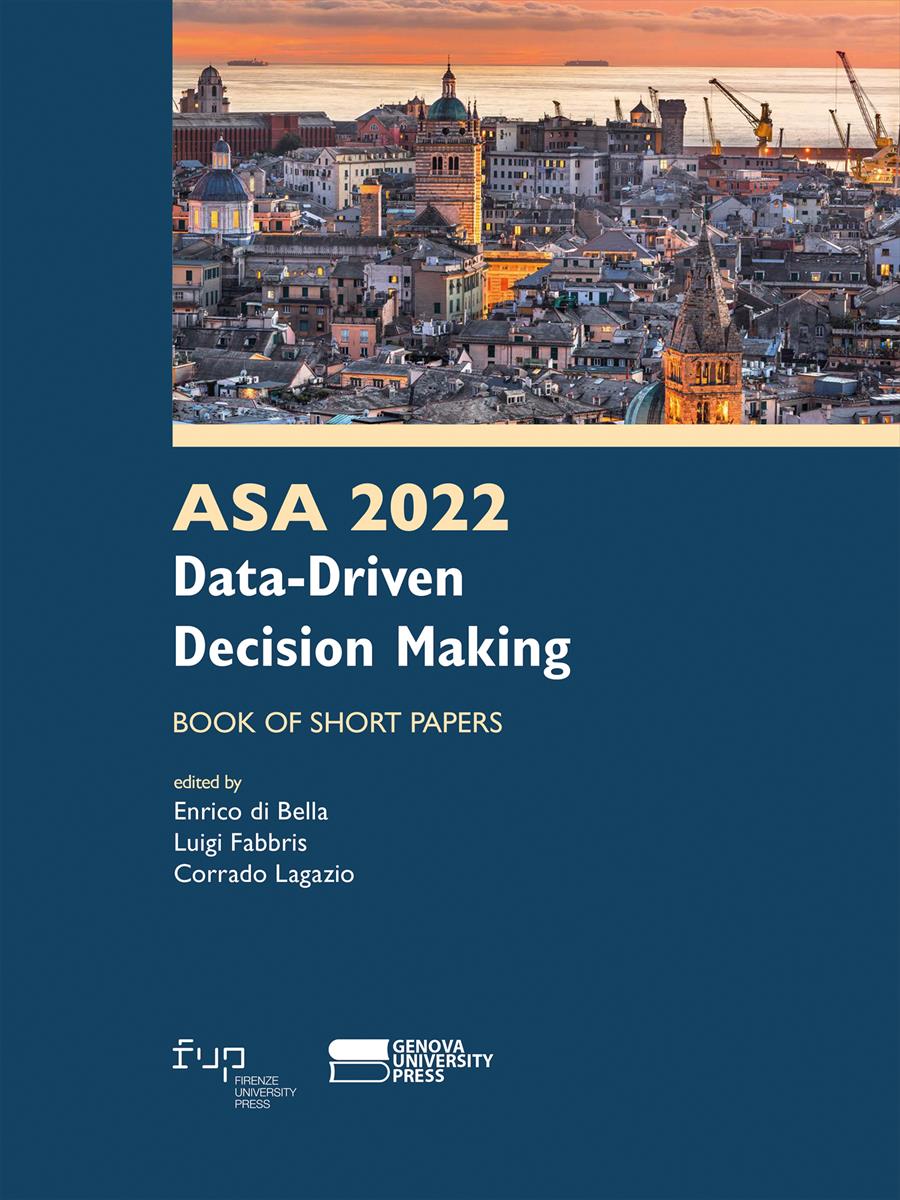- ASA 2022 Data-Driven Decision Making
- Edited by Enrico di Bella, Luigi Fabbris, Corrado Lagazio
Official statistics for measuring the sustainability of tourism: the UNWTO initiative
- Emanuela Recchini
- © 2023 Author(s) |
- CC BY 4.0
- DOI: 10.36253/979-12-215-0106-3.09
The ongoing digital transformation is facilitating the production, sharing, use and exploitation of an ever increasing amount of data. This phenomenon is stimulating the demand for data-driven decision-making. Regarding tourism, we are moving towards the production of data reflecting a sustainability perspective. The UN World Tourism Organization (UNWTO), in partnership with the UN Statistics Division, launched in 2015 the Measuring the Sustainability of Tourism (MST) initiative aiming at developing an international Statistical Framework (SF-MST) for measuring the role of tourism in sustainable development, including economic, environmental and social dimensions. The ambition is to develop a standardized basis for the collection of relevant information at appropriate spatial scales and the integration of statistics on different domains. For this purpose, the perspective of official statistics, characterized by the highest quality possible inasmuch as they are produced in compliance with the UN Fundamental Principles of Official Statistics and the European Statistics Code of Practice, is followed. SF-MST follows an accounting-based approach and sustainability is envisaged to be evaluated by measuring a broad set of capitals (produced, natural, human and social capital) and the flows of related incomes and benefits. SF-MST builds upon existing internationally agreed statistical standards and guidance in relevant areas: this ensures the adoption of a common statistical language across countries. The linking of the Tourism Satellite Account and the System of Environmental-Economic Accounting, both aligned with the UN System of National Accounts, is a central feature of SF-MST. Despite a standard accounting system is not available for social capital, SF-MST enables the integration of the social dimension of tourism’s sustainability in its own multiple capitals-based approach. SF-MST, involving a wide range of agencies and stakeholders, plays a key role in providing an integrated information basis for derivation of indicators and development of data supporting more effective decision-making towards sustainable outcomes.
- Keywords:
- Sustainable tourism,
- Sustainable development,
- Social sustainability,
- Official statistics,
- Decision-making,
ISTAT, Italian National Institute of Statistics, Italy
- Istat (2019). Integrated economic and environmental accounts for tourism: pressures of tourism industries on the natural environment. Experimental statistic, 14 march 2019. https://www.istat.it/en/archivio/228239
- Recchini E. (2018). Note on measuring the social dimension of the sustainability of tourism. Methodological contribution prepared for the UNWTO Second meeting of the Working Group of Experts on Measuring the Sustainability of Tourism, Madrid, Spain, 24-25
- Recchini E., Costantino C. (2019). Measuring the social dimension of sustainable tourism. Technical report for the UNWTO Committee on Statistics, Nineteenth meeting, Madrid, Spain 26-27 February 2019. https://webunwto.s3-eu-west-1.amazonaws.com/imported_i
- Tudini A., Ardi C., Recchini E. (2018), Italy’s MST Pilot Study, contribution for the UNWTO Committee on Statistics, Eighteenth meeting, Madrid, Spain 27-28 February 2018. https://webunwto.s3-eu-west-1.amazonaws.com/s3fs-public/2020-09/18thmeeting_item_4.
- UN (2017). Framework for the Development of Environment Statistics (FDES 2013). New York. https://unstats.un.org/unsd/environment/fdes/FDES-2015-supporting-tools/FDES.pdf
- UN, EC, FAO, IMF, OECD, World Bank (2014). System of Environmental Economic Accounting 2012 — Central Framework. New York. https://unstats.un.org/unsd/envaccounting/seearev/seea_cf_final_en.pdf
- UN, EC, OECD, IMF, World Bank (2009). System of National Accounts 2008. New York. https://unstats.un.org/unsd/nationalaccount/docs/sna2008.pdf
- UNEP, UNWTO (2005). Making Tourism More Sustainable: A Guide for Policy Makers. Paris, France; Madrid, Spain.
- UN General Assembly (2015). Transforming our world: the 2030 Agenda for Sustainable Development. 21 October 2015, A/RES/70/1. https://www.refworld.org/docid/57b6e3e44.html
- UNSC (2022). Report on the fifty-third session (28 February–2 March and 4 March 2022). New York. https://unstats.un.org/unsd/statcom/53rd-session/documents/2022-41-FinalReport-E.pdf
- UN, UNWTO (2010). International Recommendations for Tourism Statistics 2008. New York. https://unstats.un.org/unsd/publication/seriesm/seriesm_83rev1e.pdf
- UN, UNWTO, Eurostat, OECD (2010). Tourism Satellite Account: Recommended Methodological Framework 2008, United Nations publication. https://unstats.un.org/unsd/publication/seriesf/seriesf_80rev1e.pdf
- UNWTO (2018a). Statistical Framework for Measuring Sustainable Tourism – Consultation Draft. Draft prepared for discussion with the Working Group of Experts on Measuring the Sustainability of Tourism, October 2018. https://webunwto.s3.eu-west-1.amazonaws.
- UNWTO (2018b). Linking the TSA and the SEEA: A Technical Note. Madrid, Spain. https://webunwto.s3-eu-west-1.amazonaws.com/2019-08/tsaseeatechnote.pdf
- World Commission on Environment and Development (1987), Our common future, Oxford University Press.
Chapter Information
Chapter Title
Official statistics for measuring the sustainability of tourism: the UNWTO initiative
Authors
Emanuela Recchini
Language
English
DOI
10.36253/979-12-215-0106-3.09
Peer Reviewed
Publication Year
2023
Copyright Information
© 2023 Author(s)
Content License
Metadata License
Bibliographic Information
Book Title
ASA 2022 Data-Driven Decision Making
Book Subtitle
Book of short papers
Editors
Enrico di Bella, Luigi Fabbris, Corrado Lagazio
Peer Reviewed
Publication Year
2023
Copyright Information
© 2023 Author(s)
Content License
Metadata License
Publisher Name
Firenze University Press, Genova University Press
DOI
10.36253/979-12-215-0106-3
eISBN (pdf)
979-12-215-0106-3
eISBN (xml)
979-12-215-0107-0
Series Title
Proceedings e report
Series ISSN
2704-601X
Series E-ISSN
2704-5846
